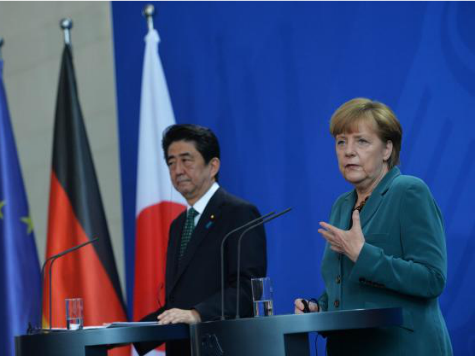
German Chancellor Angela Merkel and Japanese Prime Minister Shinzo Abe announced at a joint press conference in Berlin Wednesday that the nations stand united against further Russian invasion into Ukrainian territory and that they fully expected unanimous cooperation among the G7 on sanctions against Russia.
“We have always managed to agree on G7 declarations so far, and I see no reason why further steps should not be unanimous,” Merkel said at the joint press conference, reaffirming the commitment of the two nations to a peaceful Ukraine. The countries, along with the United States and the European Union, have frozen assets of individuals allied to President Vladimir Putin and banned new visas into their countries for these individuals, most of whom are powerful and wealthy in large part due to Russia’s large economy.
Prime Minister Abe also said at the meeting that Japan was ready to provide Ukraine with more than one million dollars in aid to help the nation build a democratic infrastructure and restabilize after the recent months’ turmoil, even if they must do so without the province of Crimea, which now belongs to Russia. Japan will also send international observers to the upcoming Ukrainian presidential election.
Prime Minister Abe is on a six-nation tour of Europe, hoping to consolidate alliances with the continent’s nations. In addition to Germany, Abe is expected to visit Britain, Portugal, Spain, France, and Belgium. On his tour, he is planning to promote a campaign he calls a “proactive contribution to peace,” in which it is expected the Japanese leader will introduce the possibility of amendments to the Japanese constitution that would allow the nation to have more than the minimum protective military forces, a provision carved out in the aftermath of World War II.
The sanctions from Japan and the West on Russia for its actions in Ukraine threaten to significantly impact the Russian economy. A forecast by the International Monetary Fund claimed that sanctions are already hurting Russia, as the nation is only expected to post 0.2% economic growth this year, down from a projection placing it at 1.3% growth. The IMF noted that investment activity has already stalled since the announcement of the sanctions and could slow down enough to injure the economy as a whole for a long-term period.

COMMENTS
Please let us know if you're having issues with commenting.